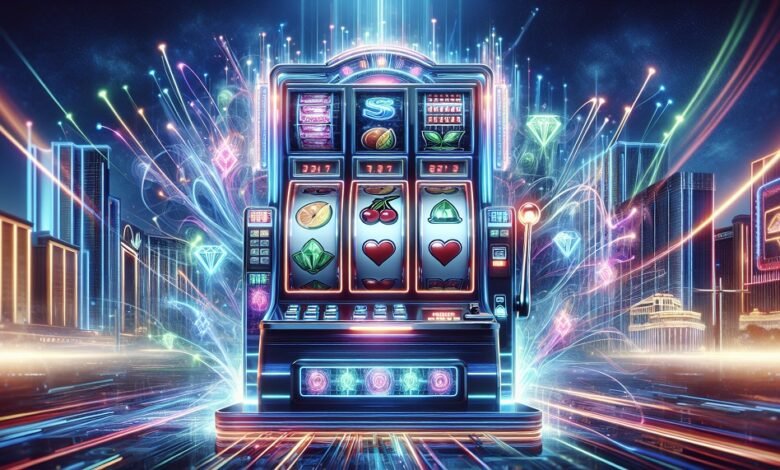Slot online games have become one of the most popular forms of online entertainment, drawing millions of players from around the globe. Their bright colors, engaging sounds, and thrilling gameplay are designed to captivate users and keep them coming back for more. But what is it about online slots that makes them so appealing? Is it just about winning money, or is there something deeper at play? The answer lies in the psychology behind slot games, where every spin taps into human behavior, emotions, and cognitive patterns.
The Allure of Instant Gratification
One of the biggest psychological factors driving the popularity of online slots is instant gratification. In our fast-paced world, people crave quick results and immediate rewards. Slot machines deliver exactly that—within seconds of pressing a button or tapping the screen, players know whether they’ve won or lost. The immediate feedback loop releases dopamine, the brain’s “feel-good” chemical, which creates a sense of pleasure and satisfaction. This dopamine hit is not just tied to winning; even near-misses can trigger a similar response, encouraging players to keep spinning.
The Role of Random Rewards
Slot online games operate on a random number generator (RNG) system, which ensures every spin is independent and unpredictable. This randomness creates a variable reward system, a concept rooted in behavioral psychology. Unlike fixed rewards, variable rewards are more enticing because players never know when the next big win will come. This unpredictability keeps players engaged, as every spin holds the slot online potential for a jackpot. It’s the same principle that keeps people hooked on social media notifications—sometimes there’s a reward, and sometimes there isn’t, but the possibility is always there.
The Power of Immersive Design
Online slot games are masterfully designed to be visually and audibly appealing. Bright colors, flashing lights, and celebratory sounds create an immersive experience that stimulates the senses. Every time a player hits a small win, even if it’s less than their initial bet, the game erupts in a flurry of lights and cheerful sounds. This sensory overload creates a positive association with spinning, even if the financial gain is minimal. The themes of the slots, whether it’s ancient Egypt, outer space, or a magical fantasy land, add another layer of engagement, transporting players into different worlds with every spin.
The Illusion of Control
Despite the randomness of slot games, players often feel like they have some control over the outcome. Whether it’s choosing how many paylines to bet on, selecting the bet amount, or deciding when to stop spinning, these choices create an illusion of control. Psychologically, this perceived control can make players feel more confident and engaged in the game, even though the results are entirely determined by the RNG. It’s a clever design element that keeps players invested in the experience.
Escapism and Stress Relief
For many players, online slots serve as a temporary escape from the pressures of daily life. The simplicity of gameplay and the excitement of potential wins create a distraction from stress, anxiety, or boredom. In a world filled with responsibilities and deadlines, a quick gaming session offers a mental break. The accessibility of slot games on mobile devices also means players can dive into their favorite games anytime, anywhere, making it an easy escape.
Chasing Losses and the Sunk Cost Fallacy
Another psychological phenomenon often seen in online slot gaming is the sunk cost fallacy. Players who have already invested time and money into a game may feel compelled to keep playing, believing that a big win is “just around the corner.” This mindset can lead to chasing losses, where players continue to spin in hopes of recovering previous losses. The emotional attachment to the game, combined with the belief that persistence will pay off, can create a cycle that’s hard to break.
Social Proof and Community Engagement
Modern online slots often incorporate social features, such as leaderboards, in-game chat options, or notifications showing other players’ wins. This creates a sense of community and social proof, reinforcing the idea that winning is not only possible but happening all around. Seeing another player hit a jackpot can create a sense of optimism and increase motivation to keep playing.
Conclusion
The psychology behind online slots goes far beyond the simple act of spinning reels. From the immediate dopamine rush of instant rewards to the immersive design, illusion of control, and the lure of variable payouts, every element of slot games is carefully crafted to tap into human psychology. Understanding these factors doesn’t diminish the fun of playing but offers valuable insight into why we find slots so irresistible. As long as players approach online slots with mindfulness and responsible gaming habits, they can continue to enjoy the thrill of the spin without falling into common psychological traps. After all, the excitement of “one more spin” is a powerful feeling, and it’s no accident that it keeps players coming back for more.
